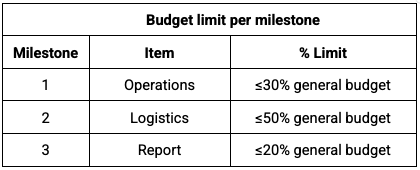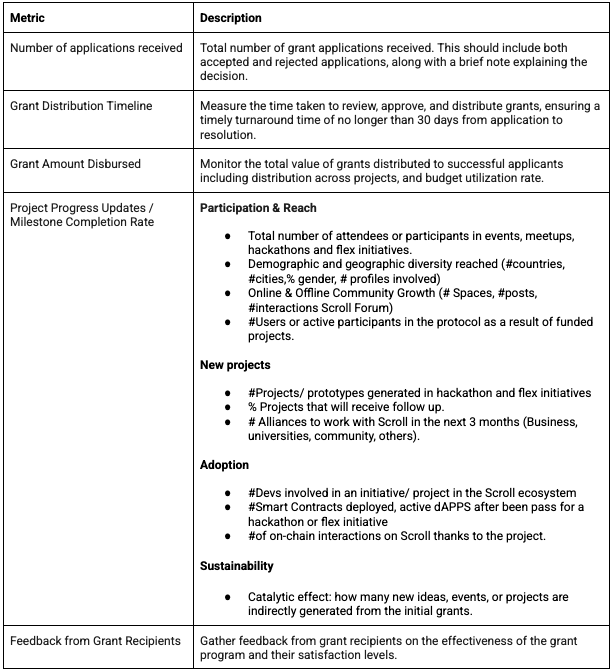This framework has been authored by @Juansito, @gabriellamena, @Joey, @mimetista.eth and myself.
TL;DR
![]() Pilot a simple 3-month community grant stream.
Pilot a simple 3-month community grant stream.
![]() Owned and run by the Community Council.
Owned and run by the Community Council.
![]() Focused on events, meetups, hackathons, flex requests.
Focused on events, meetups, hackathons, flex requests.
![]() Budget: SCR 312,500
Budget: SCR 312,500
Summary
The Community Council introduces the Community Grants Support Program, an initiative designed to fund projects worldwide that support the development and adoption of our technology in their regions. The primary objectives of this program are to:
- Foster community growth through educational, cultural, and innovative activities.
- Encourage the adoption of Scroll ecosystem products.
- Increase visibility and create new opportunities for the ecosystem across different contexts and territories.
- Promote geographic diversity and transparency in all funded initiatives.
- Support and recognize human efforts that drive growth within the Scroll ecosystem.
- Ensure traceability and demonstrable impact of allocated resources.
- Find new killer dapps and strong founders/builders in different regions
Scroll DAO will provide funding for various types of initiatives, grouped into specific categories, each with distinct guidelines and key performance indicators.
From now on, we will call applicants, teams and communities as Grantees.
All funded projects must deliver a comprehensive report demonstrating completion of the guidelines and achievement of success metrics.
Motivation
The implementation of this proposal by Scroll DAO would represent a crucial step in transferring protocol ownership to the community. This measure is intended to support communities with which we have had an incredible experience in the past and that may not yet be ready for a Local Node, as well as new event requests that would fall under this new structure with an emphasis on quality and community growth.
We believe it is important for Scroll’s success to continue supporting the grassroots relationships we have built and to have clear indicators that drive and motivate the building of relationships with new key allies.
Budget
The first iteration of the Scroll Grants Program managed by the Community Council will only disburse grants between $200 and $10,000, allowing the Community Council to refine operational efficiency before being able to distribute larger grant requests. Check the proposed budget here.
The season will last approximately 3 months, and any remaining funds will be carried over to the next season.
Disclaimer: If the grant request is happening within a Local Node Region with their endorsement, the Community Council will determine using budget from the Local Nodes budget instead of the Community Grant budget. This program should mainly focus on supporting grant requests from regions other than Local Nodes.
Types of Grants
(Categories & Guidelines)
Classified into initiatives that expand the Scroll ecosystem; these can be Events, Meetups, Hackathons, or Flex.
The guidelines described are capabilities that Grantees will execute the proposal must have. KPIs are indicators of the initiative’s measurable results that must be included in the final report.
General items to consider any of four types of grants for final report:
- When possible, a Luma event site should be created.
- When possible, registration information to be shared with the Community Council.
- Attendee satisfaction survey with a minimum score of 70%.
- Social media content plan (views, mentions, retweets, spaces).
- Event documentation (photos and videos).
- Create an engagement activity that encourages attendees to explore the Scroll ecosystem (e.g., wallet onboarding, EtherFi Cash, ChatterPay, SynthOs, HoneyPop and Polystream).
- Wherever a speaking slot, workshop slot, panel discussion, or anything alike is available
- If Scroll Foundation has the ability to provide the speaker, it should be stated in the proposal.
- Otherwise, the grantee should propose a speaker that needs to be vetted by the Community Council.
Community activity categories:
1. Events
Planned meetings aimed at more than 100 attendees, organized in person or virtually by a team/community to strengthen networks, exchange knowledge, and promote Scroll’s ecosystem products on their agenda.
Guidelines:
- Organizing team with experience in community event management.
- Present a detailed event plan, agenda, and target audience.
KPIs:
- Minimum participation of 100 attendees.
- At least 50% of attendees interact with Scroll products during the event, such as EtherFi Cash.
- Number of emerging projects, alliances, or collaborations documented in the final report
2. Meetups
A meetup is a community gathering focused on exploring the Scroll ecosystem. Its mission is to connect attendees, spark collaboration, and inspire new ways to build within Scroll.
Guidelines:
- Organizing team with experience in hosting meetups.
- Present at least one practical activity (gamification, onboarding, workshop, Scroll dApp demo).
KPIs:
- Minimum participation of 30 attendees.
- At least 50% of attendees interact with Scroll products during the event, such as EtherFi Cash.
3. Hackathon
Virtual or in-person competition for Web2 or Web3 developers to discover the Scroll ecosystem, either solo or as a team. Leveraging Scroll’s technology or ecosystem to build new novel solutions.
Guidelines:
- Hackathon must be an Ethereum Ecosystem hackathon.
- Selection of the mentor(s) for the hackathon, to be reported to the Community Council.
- Clarification on the level of expertise of hackers (beginner, intermediate, advance).
- Encourage participants to register to the Open Economy program.
- Open Economy is focusing Season 3 applications around the following criteria:
- Mobile first
- Consumer Crypto
- Provide a proposal for a Scroll dedicated track/bounty.
- Judging for Scroll tracks can be done by Scroll Foundation team, arranged with the Community Council.
- Follow-up plan for hackers after the hackathon.
KPIs:
- % of attendees who deployed on Scroll.
- Number of high quality submissions.
4. Flex
The flex category exists to support community-driven initiatives that don’t fall under hackathons, events, or meetups. We welcome applications for education programs, scholarships, or other creative proposals that strengthen and expand the Scroll community. This category is designed to give flexibility for unique ideas that bring value to the ecosystem.
Grant Process
Outline Process for Grant Application
- Interested individuals may apply through this
 application form.
application form. - Community Council will evaluate each application within 7 days.
- Detailed feedback will be provided by Community Council on each application.
- Approval of proposals should happen within 30 days of application.
- Execution and reporting will be arranged alongside the Community Council.
Submitting a Proposal (22 Sep - 19 Dec)
For an initiative to be considered, interested individuals / teams must submit an Evaluation of Grants Program through the form. Submit your proposal here.
Some relevant ideas to propose an initiative could be aligned with:
- Onboarding people to any of our native ecosystem projects:
- Leads to high potential founders.
- Introduce the Open Economy program to a founder audience.
The proposal should provide detailed context about:
- General Information: Project leader, team, and team experience information.
- Regional context: Web3 adoption level, regulatory landscape, adoption challenges, local ecosystem, existing communities.
- Proposal information: Grant type, funding request, proposal details, KPIs, detailed budget separated by milestones.
- Motivation: Why we should support your proposal and what impact you want to create with Scroll.
Evaluation (Rolling Basis)
All applications will be evaluated by the Community Council based on criteria such as strategic alignment, execution capacity, expected metrics, community impact, and financial viability.
A meeting with Grantees will be requested if necessary.
The budget costs for each type of grant will be assessed based on regional costs. The Community Council’s voting result and summary rationales will be published in the Scroll governance forum.
Approval
Grant approval will take a maximum of 30 days from the date of application by Community Council, communicated in the Scroll Forum and through established communication channels with grantees.
Rejected applications will receive written feedback.
Initial payment within 7 days of approval and last payment within 7 days of the last milestone submission. All payments will be done to the wallet provided in the application form and will be paid out in USDC on Scroll Mainnet.
Legal
- KYC/KYB will only be required for grants >$2k.
- Grant agreements will not be required for this program.
- AML Statements will need to be signed via the application form.
Execution
Funded initiatives must be implemented and finished by 31 January, 2026.
A Telegram group will be created for faster communication in the coordination and execution of the grant. Community Council may ask for meetings to oversee execution of the activity or support in the process.
Report
Grantee must submit a final report with metrics and evidence within 7 days of the proposed implementation date of the initiative on the Community Grants section on Scroll Forum. All forum reports must provide information about milestones on Karma GAP, links according Grant Type KPIs and guidelines completed.
Check KPIs in the Grants Type KPIs section.
Grants Program Key Performance Indicators (KPIs)
As the first pilot of the Grants Program, the goal is for the funding of different projects to contribute to the growth of the Scroll ecosystem in a transparent and impactful manner. Therefore, the Community Council will deliver a final report that will determine success of the program including the following metrics:
Conclusions
- The Scroll Grants Program Pilot promotes discovery of the Scroll ecosystem and technology across various regions by supporting strategic community initiatives with clear, measurable criteria. It will seek to fund events, meetups, hackathons, and flex initiatives with amounts ranging from $200 to $10,000, resulting in a total average expenditure of SCR 312,500. The Community Council is committed to managing these funds, providing team follow up and achieving team reports. CC delivers a final report on the success of this pilot.
- Management and transparency are ensured by the Community Council, which evaluates each proposal using objective standards and oversees the proper allocation and tracking of the budget throughout the three-month pilot.
- The program fosters inclusion, geographic diversity, and sustainable growth of the Scroll ecosystem, establishing impact indicators that facilitate traceability and continuous improvement for future cycles.
For all those interested, we look forward to reviewing and collaborating on your applications to our Community Grants Support Program.

